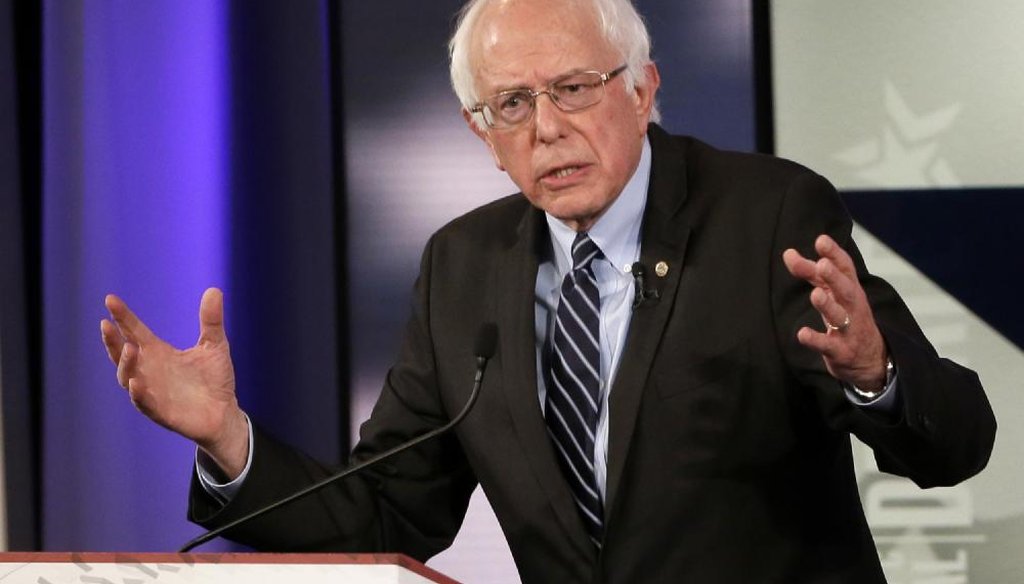Stand up for the facts!
Our only agenda is to publish the truth so you can be an informed participant in democracy.
We need your help.
I would like to contribute

Bernie Sanders at the Iowa Democratic presidential debate. (AP)
Income tax rates were 90 percent under Eisenhower, Sanders says
U.S. Sen. Bernie Sanders, I-Vt., wouldn’t reveal just how high he’d raise income taxes on the rich during the Iowa presidential debate, but he guaranteed it wouldn’t be as much as it has been in the past.
In order to pay for making college tuition-free for Americans, Sanders said that Wall Street owed the middle class for bailing it out during the recent financial crisis. He said he would demand "that the wealthiest people and the largest corporations, who have gotten away with murder for years, start paying their fair share."
"Well, let’s get specific, how high would you go?" CBS News moderator Nancy Cordes asked. "You’ve said before you’d go above 50 percent. How high?"
"We haven’t come up with an exact number yet, but it will not be as high as the number under Dwight D. Eisenhower, which was 90 percent," Sanders answered.
Was the top income tax rate under Eisenhower an astronomical 90 percent? We decided to check the ledgers on that figure.
Before we go further, let’s review what the marginal tax rate means. It’s the tax rate that’s applied to the last dollar earned. The U.S. tax system is based on brackets. The top marginal tax rate applies to the highest bracket. Income is taxed at higher rates as more is earned.
We turned to the Tax Foundation’s federal income tax rates history, which documents figures going all the way back to 1913, when the income tax began with the ratification of the 16th Amendment.
During the eight years of the Eisenhower presidency, from 1953 to 1961, the top marginal rate was 91 percent. (It was 92 percent the year he came into office.)
What does it mean, though? For the duration of Eisenhower’s presidency, that rate affected individuals making $200,000 or more per year or couples making $400,000 and above per year.
In 2015 dollars, that's roughly $1.7 million for an individual and $3.4 million for a couple.
Today the tax brackets are adjusted for inflation, but are exceptionally lower than in Eisenhower’s day. The top rate in 2015 is 39.6 percent, applied to single people making $413,200 or more per year, or married couples filing jointly making $464,850 or more annually. If we went back to 1954, single people making the equivalent of $413,200 would be in a 72 percent tax bracket, while a couple making $464,850 would end up in a 75 percent bracket.
What’s the highest income tax bracket ever put in place? In 1944-45, during World War II, couples making more than $200,000 faced an all-time high of 94 percent.
Our ruling
Sanders said income tax rates under Eisenhower were as high as 90 percent.
A look through the records shows that top earners in the eight years of Eisenhower’s presidency paid a top income tax rate of 91 percent. It was even a bit higher before he took office.
We rate Sanders’ statement True.
Our Sources
CBS News, "Democratic debate: Bernie Sanders really isn't as "socialist" as President Eisenhower," Nov. 14, 2015
PolitiFact, "Barack Obama says taxes are lower today than under Reagan, Eisenhower," Sept. 22, 2010
Tax Foundation, 2015 tax brackets, Oct. 2, 2014
Tax Foundation, historical table of individual income tax rates, accessed Nov. 14, 2015
Bureau of Labor Statistics, historical inflation calculator, accessed Nov. 14, 2015
Browse the Truth-O-Meter
More by Joshua Gillin
Income tax rates were 90 percent under Eisenhower, Sanders says
Support independent fact-checking.
Become a member!
In a world of wild talk and fake news, help us stand up for the facts.






































